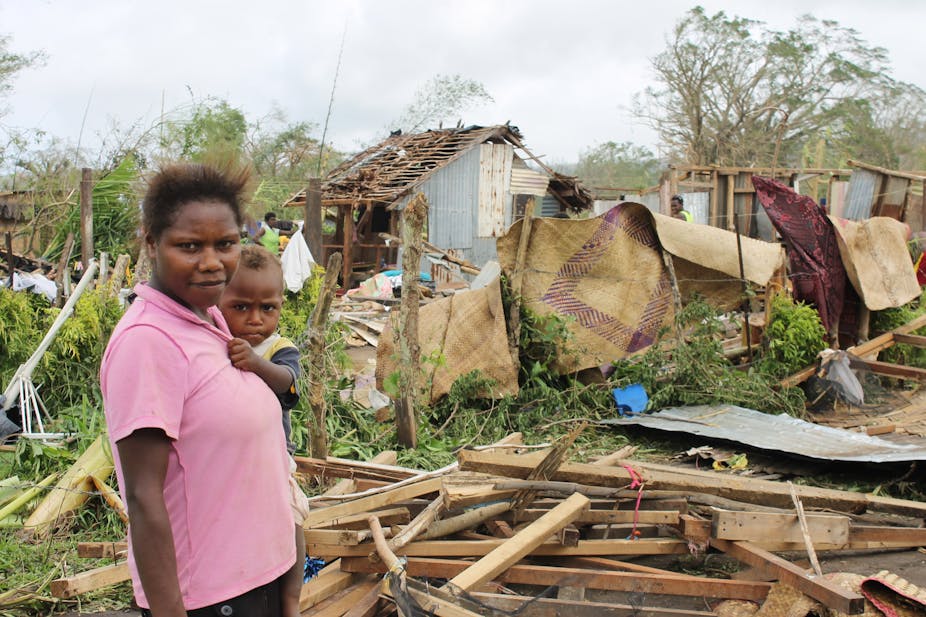The immediate focus following natural disasters such as Cyclone Pam, which has devastated Vanuatu, is almost always on the number of people affected and the numbers of deaths, roofs and houses missing, the general health status of the population, and the food, water and health services affected.
But apart from these shorter-term needs, there are important measures donors and the government of Vanuatu ought to institute now for the longer-term health of the nation. The cyclone’s aftermath provides an important opportunity to review natural disaster strategies and identify areas for improvement in what has been named the most vulnerable country to climate-related disasters.
Immediate needs
Among the most immediate problems facing Vanuatu are those stemming from contaminated water, flooding, disruption to sewer systems and lack of sanitary facilities. These are all risk factors for food contamination and illnesses, such as typhoid, cholera and gastroenteritis. The prime minister has said clean water will be the government’s first priority.
There are already media reports of a major food shortage throughout Vanuatu as a result of the cyclone. In the worst-affected areas – the Shepherd Islands and the Efate Outer Islands – most houses are without roofs or totally destroyed. Coastal and river flooding have devastated food gardens.
Replanting crops and preserving any remaining harvest is a priority to minimise long-term reliance on donated processed food, in an area already disproportionately affected by diabetes and obesity. Will the well-meant bags of donated food account for the nutritional needs of different parts of the population, such as infants who may no longer be breastfeeding because of the cyclone?
Apart from initial information-gathering on humanitarian needs and damage to both structures and the environment, there is a need to address how people will manage solid waste, implement mosquito control for malaria and dengue and prevent respiratory diseases.
Educating displaced survivors on hygienic practices, such as hand washing and boiling available water before drinking, should get immediate attention. Providing tents will stop shelters such as churches and halls being overcrowded and help contain the spread of infectious diseases.
Vital but routine public health measures are often compromised in the weeks following such disasters. The impact on child health services and maternal care could prove disastrous.
Certain other groups, such as the elderly and pregnant and nursing mothers, will need extra attention in the longer term. Children should receive particular attention to ensure they’re feeling safe while living in makeshift shelters.
Finally, monitoring for longer-term issues stemming from the cyclone, such as depression, domestic violence and substance abuse, should be put into place.
Thinking of the future
In most developed nations, the rapid responses of local providers, disaster teams and volunteers help provide appropriate interventions and health care for accident and emergency cases. Such a response is unlikely in Vanuatu.
The ministry of health distributes medical supplies to the country’s four levels of health facilities – hospitals, health centres, dispensaries and aid posts. Health centres link hospitals to dispensaries and aid posts, acting as the backbone of health care for the country.
At the best of times, many of these facilities require four-wheel-drive vehicles to deliver medical supplies because communities can quickly become inaccessible after rain swells large rivers. The absence of roads also reduces access to many facilities accessible only by boat.
Delivering medical supplies to some villages in the interior requires walking through forest for several days while carrying large cartons of medical supplies. Villagers often help those making the journey, but efficient and reliable supply, especially for temperature-sensitive medications or large and heavy items, is never guaranteed.
These issues have been amplified by the recent cyclone and will likely remain a problem for some time as what roads there were have possibly been washed away. The aid community and the government of Vanuatu should turn their attention to these challenges as the immediate needs of the population are met.
Mortality and morbidity associated with natural disasters are a growing concern because extreme climate events are likely to be increasingly frequent, particularly in the Pacific. Any public health assessment of Vanuatu should include the identification of immediate needs and associated risks, as well as put in place plans for mitigating future natural disasters.

